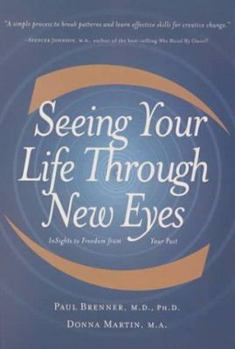Seeing Your Life Through New Eyes: A Workbook to Free Yourself from Your Past
Select Format
Select Condition 
Book Overview
Guiding readers through a series of questions about their parents, this workbook identifies formative "gifts" and "hurts" that shape how individuals approach relationships. 10 illustrations.... This description may be from another edition of this product.
Format:Paperback
Language:English
ISBN:1582700222
ISBN13:9781582700229
Release Date:January 1
Publisher:Beyond Words Publishing
Length:169 Pages
Weight:0.75 lbs.
Dimensions:0.5" x 6.0" x 9.0"
Customer Reviews
2 ratings
great tool for identifying the origins of our beliefs
Published by Thriftbooks.com User , 24 years ago
This book is a gem. Brenner and Martin make a valuablecontribution to the growing literature of freedom from the archaicpast and its limitations. They present a process to help us examinethe roots of our thinking, feeling, and automatic behaviors which canbind and paralyze us. The Family Triangles process they recommend isa simple, but not simplistic tool to navigate the confusing inwardjourney of understanding what motivates our experiences. Theprocess uses the metaphor of triangles: mommy, daddy, and me. Forboth parents, we are asked to identify the gifts and hurts weinherited. Then we examine the coping style we developed to deal withour hurts. Once these are recognized, we are shown how our copingstyles, turned inward, are actually the exact solution to the discordwe experience in our lives. Another useful insight is that the hurtswe experience are in actuality blessings, for each hurt carries withit the gift of the shadow side. Once we identify the shadow of thehurt, we can come to truly appreciate all the gifts of our childhoodexperience, and embrace everything we have encountered, thus becomingwhole and capable of choosing another path. For example, an adultmay identify the gift from his or her mother as stability, however thehurt might be criticism. In day to day life, the adult may project orautomatically assume that those who are stable are also critical,thereby misinterpreting the actions of others. This inaccurateassumption will unconsciously frame and determine the outcome of hisor her relationships. By investigating the source of this assumption,he or she is able to identify the gift in the hurt, which may bediscipline, determination or independence (to name a few).Additionally, the child most likely developed coping skills tocompensate for the hurt, such as acceptance of others (the opposite ofcriticism). As an adult, these coping skills are generally directedat others because we all fear hurting others, as we have been hurt.These coping skills will provide the solution to the pain weexperience. By applying these skills to ourselves, we learn tonurture ourselves when we hurt. This is a great tool for those whoshy away from "metaphysical" or "higher power" based toolsof self -knowledge. However, for others, it will beautifullycompliment investigations into self -imposed limitations that denyrealization of grace. Pauline and KristenArnebergMother/Daughter Team using this process.
great tool for investigating the origins of our beliefs
Published by Thriftbooks.com User , 24 years ago
This book is a gem. Brenner and Martin make a valuable contribution to the growing literature of freedom from the archaic past and its limitations. They present a process to help us examine the roots of our thinking, feeling, and automatic behaviors which can bind and paralyze us. The Family Triangles process they recommend is a simple, but not simplistic tool to navigate the confusing inward journey of understanding what motivates our experiences. The process uses the metaphor of triangles: mommy, daddy, and me. For both parents, we are asked to identify the gifts and hurts we inherited. Then we examine the coping style we developed to deal with our hurts. Once these are recognized, we are shown how our coping styles, turned inward, are actually the exact solution to the discord we experience in our lives. Another useful insight is that the hurts we experience are in actuality blessings, for each hurt carries with it the gift of the shadow side. Once we identify the shadow of the hurt, we can come to truly appreciate all the gifts of our childhood experience, and embrace everything we have encountered, thus becoming whole and capable of choosing another path. For example, an adult may identify the gift from his or her mother as stability, however the hurt might be criticism. In day to day life, the adult may project or automatically assume that those who are stable are also critical, thereby misinterpreting the actions of others. This inaccurate assumption will unconsciously frame and determine the outcome of his or her relationships. By investigating the source of this assumption, he or she is able to identify the gift in the hurt, which may be discipline, determination or independence (to name a few). Additionally, the child most likely developed coping skills to compensate for the hurt, such as acceptance of others (the opposite of criticism). As an adult, these coping skills are generally directed at others because we all fear hurting others, as we have been hurt. These coping skills will provide the solution to the pain we experience. By applying these skills to ourselves, we learn to nurture ourselves when we hurt. This is a great tool for those who shy away from "metaphysical" or "higher power" based tools of self -knowledge. However, for others, it will beautifully compliment investigations into self -imposed limitations that deny realization of grace. Pauline and Kristen ArnebergMother/Daughter Team using this process.





